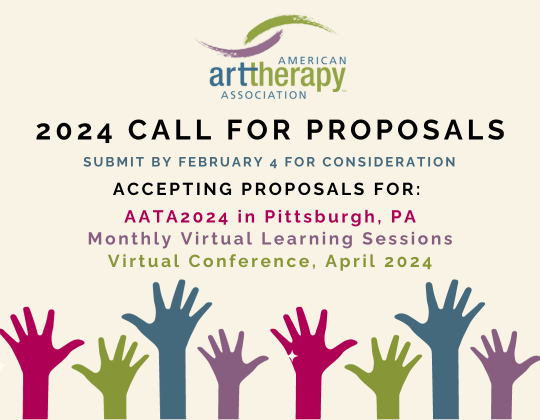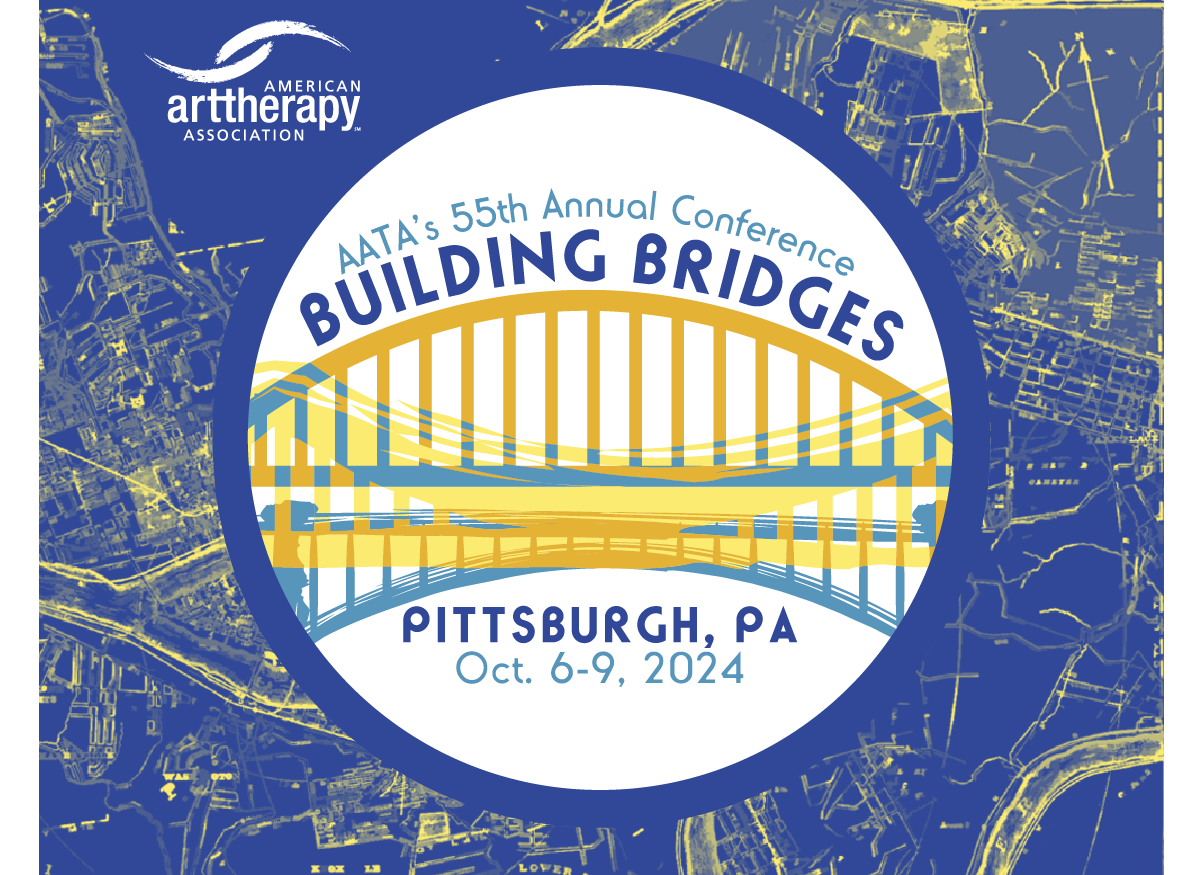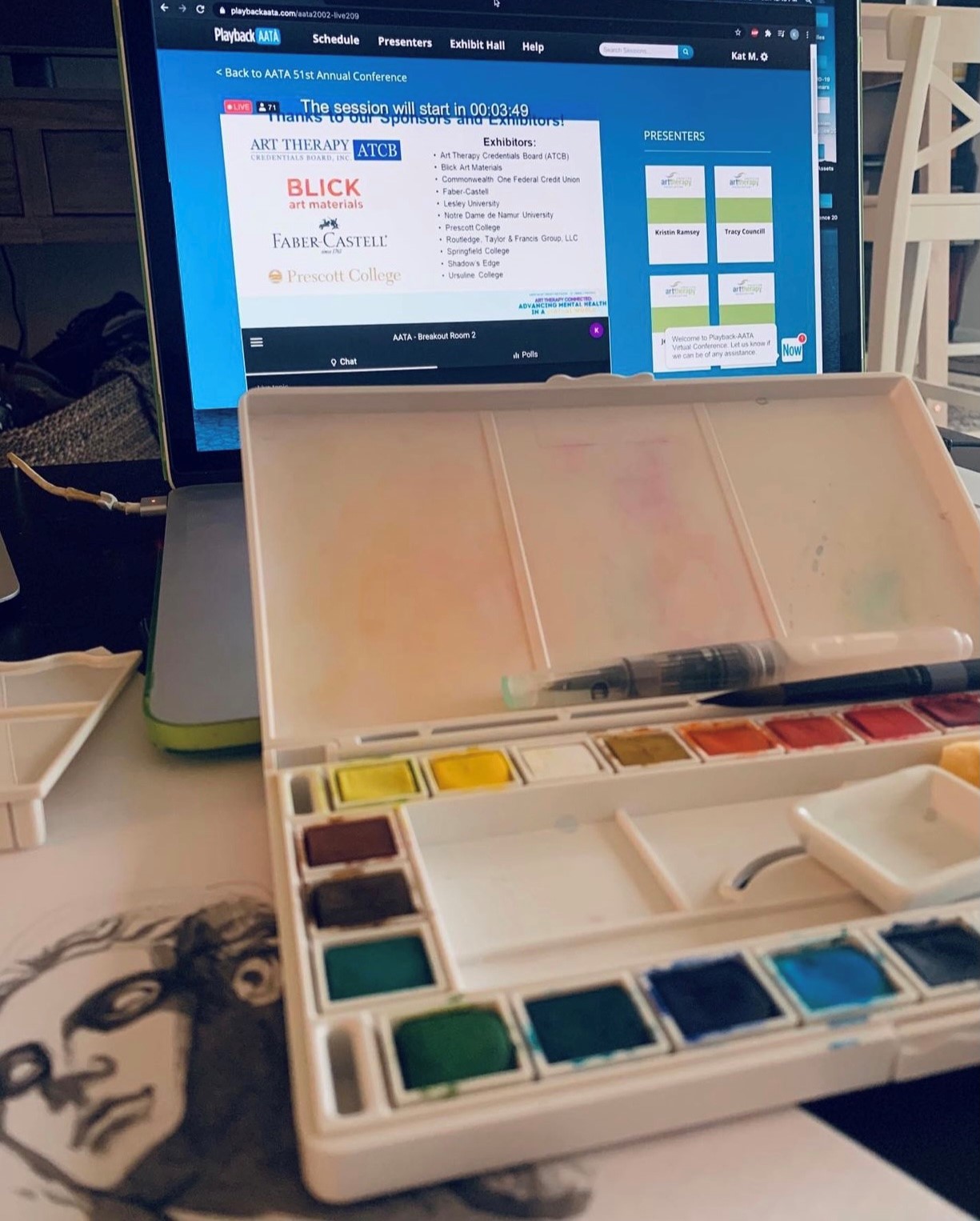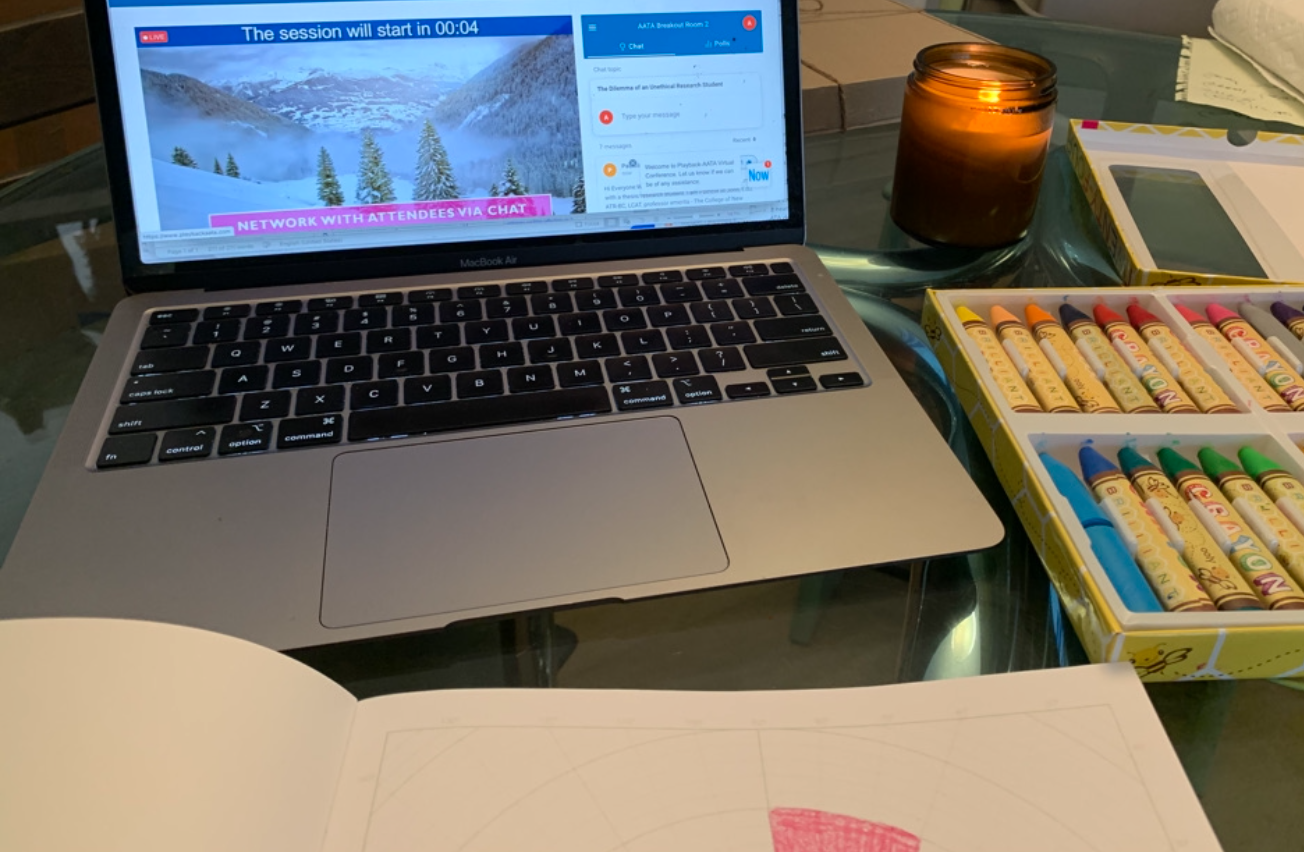December 21, 2023 | By Carolyn Brown Treadon, PhD, ATR-BC, ATCS
I am honored to announce AATA’s 2024 Call for Proposals and share with you some innovative changes we have made to the proposal process.
Our aim is to encourage participation and offer flexible options to presenters. We hope that these changes will be reflective of our values, particularly inclusivity and accessibility.

This year, AATA’s Call for Proposals invites submissions for three event opportunities:
- AATA2024, the in-person conference scheduled for Oct. 6 – 9 in Pittsburgh, PA;
- A two-day live virtual conference, tentatively planned for April 13 – 14; and
- Monthly Learning Sessions, conducted live, virtually, and available on-demand.
In past years, AATA invited proposals for our in-person conferences, but relied on volunteers “raising their hand” to present during the monthly learning sessions, or asked interested presenters unable to attend an in-person conference to present at virtual conferences. Moving forward, we want to formalize the proposal process for all AATA-sponsored learning opportunities. This will create a path where everyone feels welcome to present, regardless of whether they have presented before or are able to travel across the country (or the world).
Simply put, when you submit a proposal, you can indicate whether you’d like to be considered for the in-person conference or a virtual opportunity. All proposals will go through our blind review process to assess each submission.
We are also adding support to this new proposal process to reduce barriers for first-time presenters. Members of the Conference Committee will host an informal, virtual proposal information session on Jan. 22 make the proposal process less daunting. And for AATA members, feel free to use the MyAATA community to seek advice from colleagues.
On a personal note, as a long-time art therapist, I want to stress that presenting at an AATA conference or virtual event is an excellent way to build your credibility in the field and enable others to learn about your expertise. Many of us may struggle with being in the spotlight, but I assure you an AATA event isn’t just another academic or professional gathering. Rather, it is an opportunity for you to pull your thoughts together, polish your presentation skills, and share your expertise to help advance the art therapy profession.
Tools to Help You with the Proposal Process
- Review the Proposal Guide here.
- Watch the how-to video for submitting a proposal on the Slayte website.
- Read the Conference Committee’s 9 Tips for Submitting a Successful Proposal.
Proposal submissions for all learning opportunities are due February 5 at 11:59 pm ET.

AATA2024, the Annual In-Person Conference
The in-person conference offers presenters with the most options as to the format of presentation. Presenters may select from these formats:
- Full Day and Half Day Advanced Practice Courses held on Oct. 6, 2024
- Papers: 50-minute didactic educational sessions in which presenters share information using a PowerPoint presentation
- Panels: 1.5 hour didactic educational sessions with a panel of presenters and a moderator
- Performance Art: 50-minute didactic educational session in which presenters share information of professional issues or clinical application in art therapy through performance art modalities including drama, music, poetry, text, movement, or visual art
- Posters: 60-minute sessions in which the presenter shares information using a traditional poster. Students and professionals are invited to submit poster proposals.
- Video: 50-minute finished video on topics related to professional issues and/or clinical practice.
- Workshops: 1.5 hour didactic educational sessions with an “experiential” component to gain hands-on experience and mastery over the material covered. Art supplies are provided by AATA.
Two-Day Virtual Conference
AATA is planning a 2-day Virtual Conference, tentatively scheduled for Saturday, April 13 – Sunday, April 14, 2024.
The Virtual Conference will be hosted live on Zoom or a similar platform and recorded for viewing in AATA’s Online Learning Academy.
The conference will be comprised of 60-minute sessions in the following formats:
- Panel with 3 – 5 presenters (including the moderator) using a PowerPoint presentation with time for audience questions.
- Paper, which includes one presenter sharing information using a PowerPoint presentation with time for audience questions.


Monthly Learning Sessions
AATA’s Monthly Learning Series is comprised of monthly virtual sessions on various topics presented live via Zoom and eligible for Continuing Education credit. Recordings of the sessions are available for viewing in AATA’s Online Learning Academy. We expect to host at least 12 of these sessions throughout the year.
For presenters, the Monthly Learning Series offers flexibility. These sessions are presented approximately once a month, providing flexibility in scheduling the date of the presentation. AATA is seeking presentations that fill a minimum of 2-hour increments, ranging from 2 to 6 hours.
Presentations must offer a minimum 50 minutes of educational content in the following formats:
- Panel with 3 – 5 presenters (including the moderator) using a PowerPoint presentation with time for audience questions.
- Paper, which includes one presenter sharing information using a PowerPoint presentation with time for audience questions.
Program Tracks for All Submission Opportunities
This year, all three submission opportunities (Monthly Learning Series, In-Person Conference, and Virtual Conference) will be organized into nine main subject tracks to help participants find areas of interest. Each proposal submitter must select one subject track to best describe their session.
- Clinical Approaches: Proposals that present information on therapeutic best practices, case studies, and art therapy techniques and methods, including Addictions/Substance Abuse (AS), Geriatrics (GE) Psychiatric Settings (PS), Child/Adolescents (CA), Medical Settings (MS), School Settings (SS), and Forensics (FS).
- Contemporary Issues/Current Trends: Proposals that present information in the one of the following areas of interest: Activism (AC), Grief/Mourning (GM), Autism (AU), Professional Practice (PP), Trauma (TR), and Ethics (ET).
- Diversity, Equity, and Inclusion (DEI): Proposals within this category, grounded in the DEI activist movement, explore studies in art therapy assessments, current research, and theoretical models.
- Education & Supervision (ES): Proposals that present information on updates in art therapy training and education and the latest teaching methods. Or focus on supervision techniques, and educational developments.
- Multicultural Perspectives (MP): Proposals in this category distinctly highlight the impact of diverse cultural backgrounds on art therapy practices.
- Research/Evaluation (RE): Proposals that present theory and practice of clinical evaluation, the use of standardized assessments, systematic case studies, outcome studies, and all forms of inquiry, using or exploring various research methodologies.
- Studio & Community (SC): Proposals that present art studio-based approach, and how artist-centered art therapy practice and community outreach programs are designed to improve our collective well-being.
- Technology & Innovation (TI): Proposals that showcase advancements in technology, cutting-edge research, and innovative models in the field of technology.
- Theory & Assessment (TA): Proposals that present studies in art therapy assessments, current research, and theoretical models which should be presented by experienced researchers.
